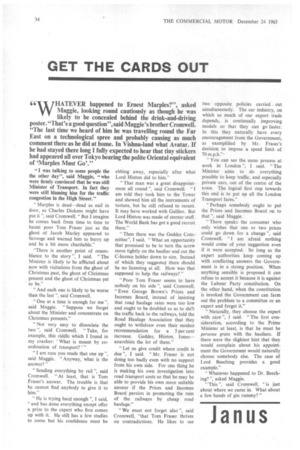GET THE CARDS OUT
Page 36

If you've noticed an error in this article please click here to report it so we can fix it.
6 6 HATEVER happened to Ernest Marples?", asked Maggie, looking round cautiously as though he was likely to be concealed behind the drink-and-driving poster. "That's a good question", said Maggie's brother Cromwell. "The last time we heard of him he was travelling round the Far East on a technological spree and probably causing as much comment there as he did at home. In Vishnu-land what Avatar. If he had stayed there long I fully expected to hear that tiny stickers had appeared all over Tokyo bearing the polite Oriental equivalent of `Marples Must Go'."
"I was talking to some people the the other day", said Maggie, "who were firmly convinced that he was still Minister of Transport. In fact they were still blaming him for the traffic congestion in the High Street."
" Marples is dead—dead as nail in door, as Charles Dickens might have put it ", said Cromwell. "But I imagine he comes back from time to time to haunt poor Torn Fraser just as the ghost of Jacob Marley appeared to Scrooge and warned him to hurry up and be a bit more charitable."
"There is another point of resemblance to the story ", I said. "The Minister is likely to be afflicted about now with visitations from the ghost of Christmas past, the ghost of Christmas present and the ghost of Christmas yet to be."
"And each one is likely to be worse than the last ", said Cromwell.
"One at a time is enough for me said Maggie. "Suppose we forget about the Minister and concentrate on Christmas presents."
"Not very easy to dissociate the two ", said Cromwell. "Take, for example, this riddle which I found in my cracker: 'What is meant by coordination of transport? ' " "I am sure you made that one up said Maggie. "Anyway, what is the answer?"
"Sending everything by rail ", said Cromwell. "At least, that is Tom Fraser's answer. The trouble is that he cannot find anybody to give it to him."
"He is trying hard enough ", I said, "and has done everything except offer a prize to the expert who first comes up with it. He still has a few studies to come but his confidence must be ebbing away, especially after what Lord Hinton did to him."
"That man was a great disappointment all round ", said Cromwell. "I am told they took him to the Tower and showed him all the instruments of torture, but he still refused to recant. It may have worked with Galileo. But Lord Hinton was made of sterner stuff. The World Bank has got a good recruit there."
Then there was the Geddes Committee", I said. "What an opportunity that promised to be to turn the screw more tightly on the haulier and cut the C-licence holder down to size. Instead of which they suggested there should be no licensing at all. How was that supposed to help the railways?
"Poor Tom Fraser seems to have nobody on his side ", said Cromwell. "Even George Brown's Prices and Incomes Board, instead of insisting that road haulage rates were too low and ought to be doubled so as to shift the traffic back to the railways, told the Road Haulage Association that they ought to withdraw even their modest recommendation for a 5 per cent increase. Geddes, Hinton, Jones— anarchists the lot of them."
"Let us give credit where credit is due ", I said. "Mr. Fraser is not doing too badly even with no support from his own side. For one thing he is making his own investigation into road transport costs so that he may be able to provide his own more suitable answer if the Prices and Incomes Board persists in promoting the ruin of the railways by cheap road haulage."
"We must not forget • also ", said Cromwell, "that Tom Fraser thrives on contradictions. He likes to see two opposite policies carried . out simultaneously. The car industry, on which so much of our export trade depends, is continually improving models so that they can go faster. In this they naturally have every encouragement from the Government, as exemplified by Mr. Fraser's decision to impose a speed limit of 70 m.p.h.", 'You can see the same process at work in London ", I said. "The Minister aims to do everything possible to keep traffic, and especially private cars, out of the centre of the town. The logical first step towards this end is to put up all the London Transport fares."
"Perhaps somebody ought to put the Prices and Incomes Board on to that ", said Maggie.
" There speaks the consumer who only wishes that one or two prices could go down for a change ", said Cromwell. "I am afraid nothing would come of your suggestion even if it were accepted. So long as the expert authorities keep coming up with conflicting answers the Government is in a strong position. When anything sensible is proposed it can refuse to accent it because it is against the Labour Party constitution. On the other hand, when the constitution is invoked the Government can farm out the problem to a committee or an expert and forget it."
"Naturally, they choose the expert with care ", I said. "The first consideration, according to the Prime Minister at least, is that he must be persona grata with the hauliers. If there were the slightest hint that they would complain about his appointment the Government would naturally choose somebody else. The case of Lord Beeching provides a good example."
"Whatever happened to Dr. Beeching? ", asked Maggie.
"This ", said Cromwell, " is just about where we came in. What about a few hands of gin rummy?"












































































